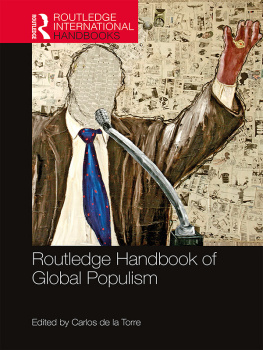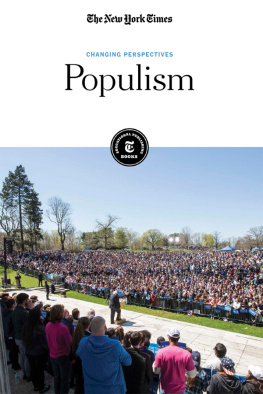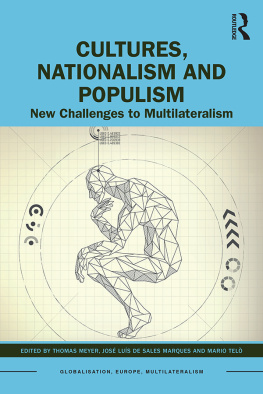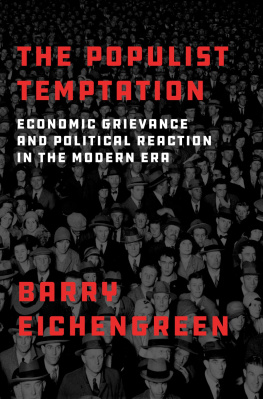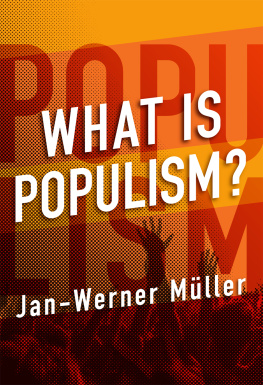GLOBAL POPULISMS
This ground-breaking textbook describes and explains the global manifestations of populism. It reviews controversies about its relationships with democracy in the distinct and interrelated histories of the Americas, Asia, and Europe. The volume surveys the similarities and differences between populism, nationalism, fascism, and populist uses of religion and the media.
Global Populisms invites students and the general public to move beyond simplistic conceptualizations of populism as an external virus and as an irrational threat to democracy, or, alternatively, as the path to return power to the people. The book differentiates populists correct critiques to inequalities, the loss of national sovereignty, and unresponsive politicians from its solutions. In the name of giving power to the people, populists in power from Hugo Chvez to Donald Trump, Narendra Modi, and Viktor Orbn entered in war with the media, made rivals into existential enemies, and attempted to concentrate power in the hands of the president.
Written in a clear and accessible style, this interdisciplinary volume will appeal to undergraduate students as well as to non-academic audiences with an interest in political science, sociology, history, and communication studies.
Carlos de la Torre is Professor and Director of the Center for Latin American Studies at the University of Florida. He has a PhD from the New School for Social Research. He has been a fellow at the Simon Guggenheim Foundation, and the Woodrow Wilson Center for Scholars. He is the author of Populisms: A Quick Immersion, and Populist Seduction in Latin America. He is the editor of The Routledge Handbook of Global Populism, The Promise and Perils of Populism, Latin American Populism of the Twenty First Century (co-edited with Cynthia Arnson). He has taught courses on populism at the graduate and undergraduate levels.
Treethep Srisa-nga holds a Masters in Latin American Studies from the Center for Latin American Studies at the University of Florida. He earned his BA in Spanish (First Class Honors) from Chulalongkorn University, Bangkok, and was a journalist at the Spanish news agency Agencia EFEs Asia-Pacific regional office. His research interests include comparative populism, democratization, and authoritarianism, with a regional focus on Southeast Asia and Latin America.
First published 2022
by Routledge
2 Park Square, Milton Park, Abingdon, Oxon OX14 4RN
and by Routledge
605 Third Avenue, New York, NY 10158
Routledge is an imprint of the Taylor & Francis Group, an informa business
2022 Carlos de la Torre and Treethep Srisa-nga
The right of Carlos de la Torre and Treethep Srisa-nga to be identified as authors of this work has been asserted by them in accordance with sections 77 and 78 of the Copyright, Designs and Patents Act 1988.
All rights reserved. No part of this book may be reprinted or reproduced or utilised in any form or by any electronic, mechanical, or other means, now known or hereafter invented, including photocopying and recording, or in any information storage or retrieval system, without permission in writing from the publishers.
Trademark notice: Product or corporate names may be trademarks or registered trademarks, and are used only for identification and explanation without intent to infringe.
British Library Cataloguing-in-Publication Data
A catalogue record for this book is available from the British Library
Library of Congress Cataloging-in-Publication Data
A catalog record has been requested for this book
ISBN: 978-0-367-33214-3 (hbk)
ISBN: 978-0-367-33217-4 (pbk)
ISBN: 978-0-429-31851-1 (ebk)
DOI: 10.4324/9780429318511
Typeset in Sabon
by codeMantra
DOI: 10.4324/9780429318511-1
On January 6, 2021, thousands of supporters of Donald Trump came together at Washington DCs Ellipse park to join the Save America rally. Shouting Stop the Steal and waving flags that boasted the name of their Republican leader, the demonstrators vehemently and angrily refused to recognize the electoral triumph of the Democratic Partys presidential candidate Joe Biden, insisting that their leader had won the election. At around midday, the outgoing president himself went on stage to speak to the outraged crowd. Reiterating that his victory was snatched from him because of electoral irregularities, he called on his supporters to walk down to the Capitol to pressure the Congress not to formalize Bidens win. True to Trumps words that they had to show strength and be strong, his supporters some of whom were armed stormed into the Capitol building, assaulted security personnel, occupied the Senate floor, and tried to take lawmakers hostage. As shots were fired and chaos shook the symbol of American democracy to its core, it was revealed once again that the U.S. was no longer an exception to populism and populist seductions. Just as Trumps 2016 electoral triumph sent a shockwave across the globe and made populism one of the most popular terms in the social sciences, the January 6 insurrection effectively reminded us of how far populism, polarization, and radicalization could imperil any kind of democracy, including one of the strongest in the world.
Opening social media, newspapers, or watching the news gives the impression that populism is everywhere. Scholars and pundits use this term to describe the Brexit vote, rightwing leaders like Donald Trump, Jair Bolsonaro in Brazil, and Viktor Orbn in Hungary, or the left-leaning parties Syriza in Greece and Podemos (Yes, We Can) in Spain. If at the turn of the twenty-first century left populists were in power in four Latin American nations (Argentina, Venezuela, Bolivia, and Ecuador), in 2018 the governments of eight countries of the European Union (Austria, Belgium, Denmark, Finland, Italy, Poland, Hungary, and Slovakia) were led by far-right nationalist, and xenophobic parties (Traverso 2019, 3). In 2020 the three largest democracies in the world Brazil, India, and the U.S. were in rightwing populists hands.
Not long ago, the term populism was often used to describe personalist politics in Latin America, Africa, or Asia, or to analyze the U.S. Populist Party of the 1890s. When a group of renowned scholars met at the London School of Economics in 1967 to discuss the nature, history, and international aspect of populism, Europe was absent from their discussion (Ionescu and Gellner 1969). The prominence of populism in Europe is a historical novelty. Similarly, until Trumps election in 2016 it was thought that U.S. democratic institutions would keep populism at the margins of the political system.
From a secondary topic in the social sciences and the humanities, populism is becoming a prominent field of study. The editors of the Oxford Handbook of Populism note that between 1990 and 2010 approximately twelve hundred books on populism were published in English (Rovira Kaltwasser, Taggart, Ochoa Espejo and Ostiguy 2017, 10). Major editorial houses like Routledge and Oxford University Press published short introductory volumes, as well as comprehensive handbooks, and a new journal, Populism, was made available by Brill.
The proliferation of academic and journalist studies shows the importance of populism globally. The term has been used to describe movements like Occupy Wall Street or the Spanish Indignados, rightwing and leftwing administrations, past and current charismatic leaders like Trump, Chvez, or Bolsonaro. To start disentangling the ambiguous meanings of this term, it might be helpful to analyze how it is used by different political actors.


